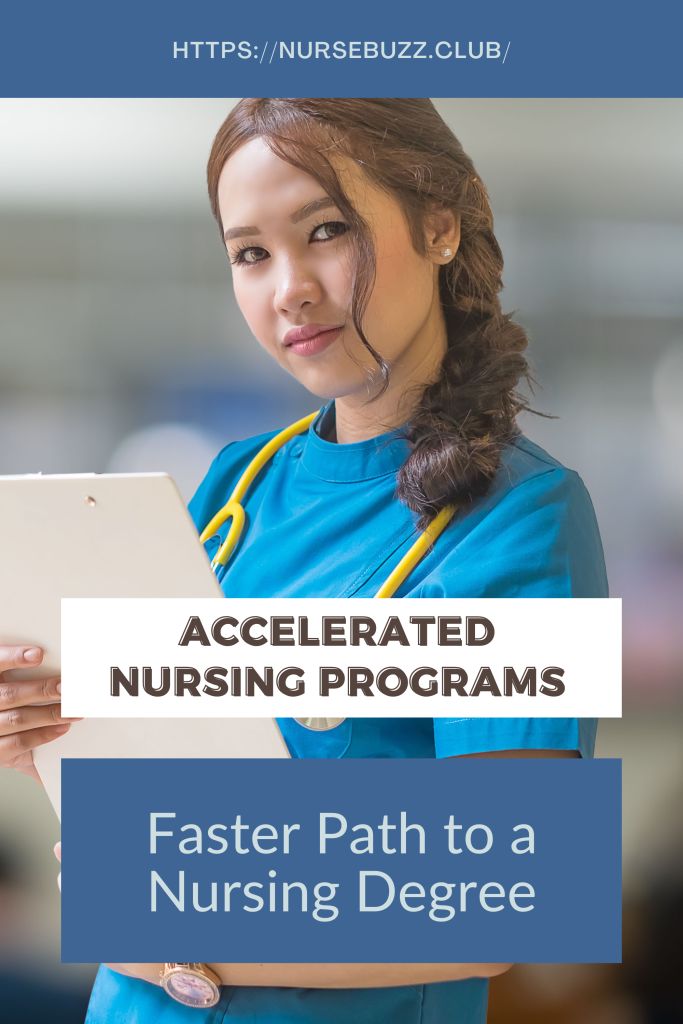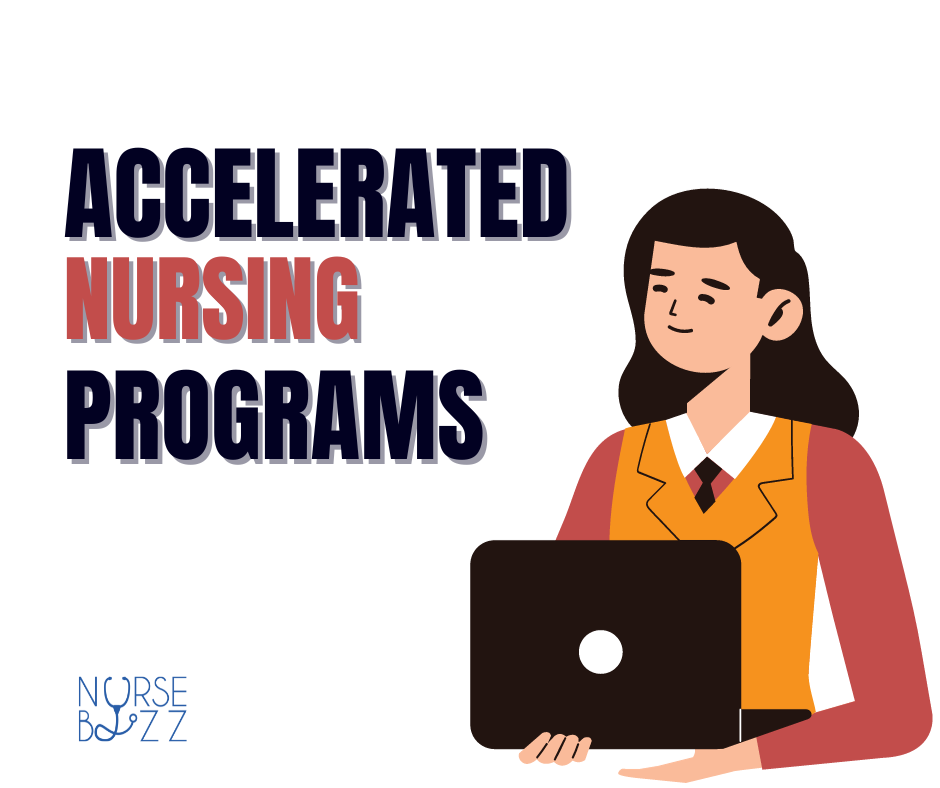Uncover the best accelerated nursing programs that fit your needs. Fast, focused, and flexible options for aspiring nurses.
Are you looking to earn your nursing degree in the shortest time possible? Accelerated nursing programs might be your answer. In this guide, we will explore what is accelerated nursing programs are, their advantages and disadvantages, how to choose the best program, tips for success, and address some frequently asked questions.
1. What Is an Accelerated Nursing Program?
Accelerated nursing programs are specifically designed to cater to individuals who strongly desire to pursue a career in nursing but are looking for an expedited route to achieve their educational and professional goals. These programs have gained popularity for their remarkable efficiency in providing aspiring nurses with the quickest pathway to a nursing degree. The hallmark of an accelerated nursing program is its ability to significantly compress the traditional nursing education timeline. It typically takes about 11 to 18 months to complete, making it one of the fastest ways to earn a nursing degree.
2. The Advantages and Disadvantages of Accelerated Nursing Programs

The fastest nursing degrees come with unique advantages and disadvantages, making them a choice that requires careful consideration.
Advantages:
Fastest Nursing Degree: One of the primary advantages of accelerated nursing programs is the speed at which you can earn your nursing degree. These programs are renowned for their efficiency, allowing you to become a registered nurse in a significantly shorter time than traditional programs. This quick turnaround means you can enter the workforce sooner, which is particularly appealing if you are eager to start your nursing career promptly.
Career Transition: Fast track nursing programs are exceptionally well-suited for individuals considering a career change. If you have already pursued a different profession but have decided to pivot towards nursing, these programs provide a focused and rapid route to help you transition. This adaptability is a crucial advantage, allowing you to capitalize on your prior education and experiences.
In-Demand Profession: Nursing is consistently ranked among the most in-demand professions. This is a significant advantage for individuals completing an accelerated nursing program, as it positions them well in the job market. With a critical shortage of healthcare professionals, particularly nurses, these fastest nursing degrees offer a direct path to a career in a field where your skills are highly sought after.
Disadvantages:
Intensive: The intensive nature of fast track nursing programs is a common disadvantage. Due to the condensed curriculum and clinical training, students are often required to dedicate significant time and effort to their studies. The fast-paced nature of the program can be mentally and physically demanding, which can pose challenges for some individuals.
Limited Work Hours: While accelerated programs allow you to earn your degree swiftly, they may limit your ability to work part-time or hold a full-time job simultaneously. The demanding nature of the coursework and clinical hours can make it difficult to maintain outside employment. This limitation can be a financial consideration for those who rely on income from work while pursuing their nursing degree.
Higher Costs: Another aspect to consider is the cost of fastest nursing degree. Tuition fees for these programs can be higher compared to traditional nursing programs. The expense is often justifiable due to the expedited education and career opportunities that follow, but it’s essential to be prepared for the financial investment.
3. How to Choose the Best Program

Selecting the right accelerated nursing program is a pivotal decision on your path to becoming a registered nurse. The following factors should be carefully considered to ensure that the program aligns with your career goals and personal circumstances:
1. Accreditation:
It is of utmost importance to choose an accelerated nursing program that is accredited. Accreditation ensures that the program meets the necessary quality and educational standards, making you eligible for the licensure exams required to become a registered nurse. The two main accrediting bodies for nursing programs in the United States are the Accreditation Commission for Education in Nursing (ACEN) and the Commission on Collegiate Nursing Education (CCNE). Verify that the program you’re considering has accreditation from one of these organizations.
2. Location:
The location of the program can significantly impact your experience. Consider whether you prefer an on-campus program or if you are interested in an online option. On-campus programs provide the advantage of face-to-face interaction with professors and classmates, as well as access to campus resources. On the other hand, online programs offer flexibility and the ability to study from anywhere, making them suitable for those with busy schedules or other commitments.
3. Cost:
The cost of an accelerated nursing program can vary widely. It’s crucial to evaluate your budget and the financial resources available to you. Take into account not only tuition but also additional expenses like books, materials, and clinical fees. Explore potential financial aid options, scholarships, or grants that can help alleviate the financial burden.
4. Prerequisites:
Different fast track nursing programs may have varying prerequisites and admission requirements. Academic institutions often consider minimum GPA requirements, letters of recommendation, and standardized test scores like the GRE or TEAS (Test of Essential Academic Skills) as part of their admission criteria. Ensure that you meet all the prerequisites for the program you’re interested in and plan accordingly.
5. Program Length:
The duration of accelerated nursing programs can differ. Some programs are as short as 11 months, while others may take up to 18 months. Consider your own timeline and how quickly you wish to complete your nursing education.
6. Support Services:
Research the support services offered by the program. Are there academic advisors or career counselors available to assist students? Access to support can greatly contribute to your success in the program.

7. Reputation:
Look into the program’s reputation and its track record in preparing students for a successful nursing career. Online reviews, graduate employment rates, and alumni testimonials can provide insights into the program’s effectiveness.
8. Personal Goals and Circumstances:
Finally, assess how the program aligns with your personal goals and circumstances. Consider whether the program’s schedule, location, and cost are compatible with your life and responsibilities. It’s essential to choose a program that you feel confident and comfortable committing to.
4. Tips for Succeeding in an Accelerated Nursing Program
Completing an accelerated nursing program is undoubtedly challenging, but it’s also a rewarding journey. To ensure your success in this intensive educational experience, consider the following tips:
1. Effective Time Management:
Time management is the cornerstone of success in an accelerated nursing program. With a rigorous curriculum and demanding schedule, efficiently allocating your time is paramount. Create a detailed daily or weekly schedule that encompasses your classes, study sessions, clinical hours, and personal life. Prioritize tasks and stick to your schedule as closely as possible to stay on top of coursework.
2. Study Smart, Not Hard:
In a fast track nursing programs, you’ll need to focus on essential materials to manage your workload effectively. Use effective study techniques, such as active recall, summarization, and practice questions. Avoid the temptation to overstudy or get bogged down in less important details. Remember, understanding the core concepts and nursing principles is more important than memorization.
3. Utilize Support Systems:
One of the key assets during your journey through an accelerated nursing program is the support systems available to you. These may include academic advisors, faculty members, tutors, and fellow students. Don’t hesitate to reach out to professors or instructors when you encounter challenges or need clarification. Join study groups or connect with classmates to share notes and insights. The camaraderie and collective problem-solving can be incredibly valuable.
4. Stay Organized:
Maintaining a high level of organization is vital for success. Invest in a planner or use digital tools to track assignments, deadlines, and important dates. Keep your study materials organized and readily accessible. Effective organization will help you avoid last-minute stress and ensure you never miss a crucial assignment or exam.
5. Self-Care:
Prioritizing your physical and mental well-being is absolutely essential. While the program is demanding, it’s essential to prioritize self-care. Maintain a healthy diet, exercise regularly, get adequate sleep, and practice stress-relief techniques like meditation or deep breathing. Make time for activities you enjoy to recharge and prevent burnout.
6. Stay Adaptable:
Flexibility and adaptability are valuable traits in an accelerated nursing program. Be prepared for changes in the schedule, unexpected challenges, and the need to balance multiple responsibilities. Cultivating a positive and solution-driven mindset can have a substantial impact on your capacity to surmount challenges.
7. Seek Clinical Experience:

Clinical experience is a crucial component of nursing education. Seek out opportunities for hands-on practice, either within your program or through volunteer work. Practical experience reinforces what you learn in the classroom and prepares you for real-world nursing scenarios.
8. Continuous Self-Assessment:
Regularly assess your progress and adapt your strategies as needed. If a particular study method isn’t working, be willing to try something new. Continuously evaluating your performance and making adjustments can help you stay on track and succeed.
Read About: How to Write Nursing Cover Letter with Examples and Tips
5. Alternative Paths to Nursing Programs
While traditional nursing programs, including accelerated ones, are a popular choice for aspiring nurses, there are alternative paths available. One such alternative is pursuing a Licensed Practical Nurse (LPN) program. Here’s a closer look at LPN programs and other alternatives:
1. Licensed Practical Nurse (LPN) Programs:
Overview: LPN programs are relatively shorter than Registered Nurse (RN) programs, typically taking about 12 to 18 months to complete. These programs focus on practical nursing skills and essential nursing knowledge.
Scope of Practice: LPNs provide basic nursing care, including administering medications, monitoring patients’ vital signs, and assisting with daily activities. They work under the supervision of registered nurses and physicians.
Advantages: LPN programs are known for their shorter duration, making them an accessible entry point into nursing. These programs offer a fundamental education in nursing skills and can act as a springboard for individuals aspiring to become registered nurses through LPN-to-RN bridge programs.
Considerations: LPNs have a more limited scope of practice compared to RNs. Depending on the state, there may be some restrictions on the settings where LPNs can work. Many LPNs choose to advance their careers by pursuing further education to become RNs.
2. Associate Degree in Nursing (ADN) Programs:

Overview: ADN programs typically take around two years to complete. These programs provide a comprehensive nursing education and prepare students to become RNs.
Scope of Practice: ADN-prepared RNs have a broader practice scope than LPNs. They can administer medications, conduct assessments, and provide a wide range of nursing care.
Advantages: ADN programs offer a balanced approach to nursing education, combining essential theory with clinical experience. Graduates are eligible to take the NCLEX-RN exam, the licensure exam for registered nurses.
Considerations: Some healthcare settings and employers may prefer or require BSN-prepared RNs, leading ADN graduates to pursue further education to earn their Bachelor of Science in Nursing (BSN).
3. Bachelor of Science in Nursing (BSN) Programs:
Overview: BSN programs are four-year programs that offer a comprehensive nursing education, encompassing both theory and clinical practice.
Scope of Practice: BSN-prepared RNs have a wide area of practice and often enjoy more career opportunities. They are well-prepared for leadership roles in nursing and may work in various healthcare settings.
Advantages: BSN programs provide a robust education emphasizing critical thinking, research, and community health. Many healthcare facilities prefer or require BSN-prepared RNs due to their advanced skill set.
Considerations: BSN programs typically take longer than LPN or ADN programs. However, many ADN-prepared RNs pursue RN-to-BSN programs to advance their careers and meet the demand for BSN-educated nurses.
6. Conclusion
In conclusion, accelerated nursing programs offer a speedy path to a rewarding nursing career. While they come with challenges, the advantages outweigh the disadvantages for many. You can achieve your nursing degree in record time by choosing the right program and following our tips for success.
7. Frequently Asked Questions (FAQ)
Q: What is an accelerated nursing program?
A: An accelerated nursing program is a specialized, intensive educational pathway designed for individuals without nursing backgrounds who aspire to become registered nurses in a shorter timeframe, typically 11 to 18 months. These programs prioritize efficiency, equipping students with the knowledge and skills needed for a nursing career, making them ideal for career changers.

Q: How challenging are accelerated nursing programs?
A: Fastest nursing degrees are known for their intensity and academic rigor. With demanding coursework and a rapid learning pace, students need exceptional time management and dedication. While challenging, success is attainable with commitment, effective study strategies, and support from faculty and peers. The goal is to prepare students for a rewarding and impactful nursing career.
Q: Can I complete an accelerated nursing program online?
A: Yes, many institutions offer online accelerated nursing programs for flexibility. These programs blend online lectures, virtual simulations, and in-person clinical experiences. They suit those balancing studies with work or family responsibilities. Ensure your chosen program is accredited and meets state licensure requirements.




